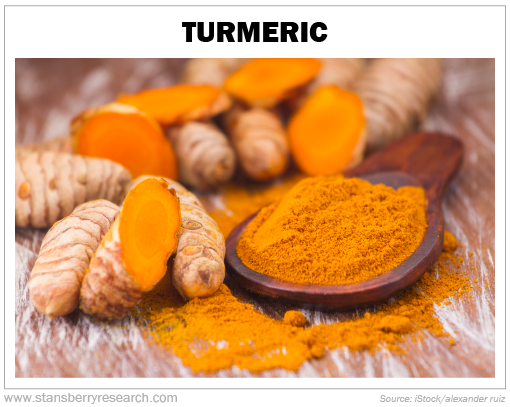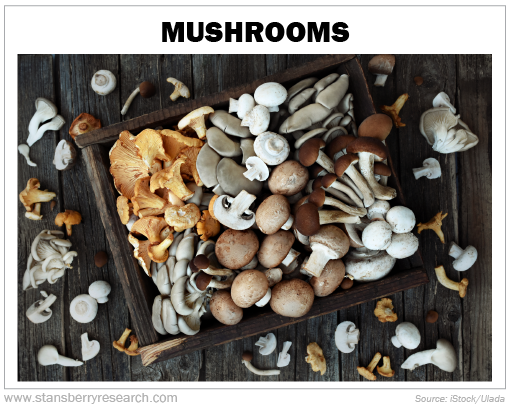Around 60 million Americans can point to this common problem for what ails them... and it's a $90 billion drain on the U.S. health care system every year.
Chronic inflammation is one of the least talked about – but most important – health crises of our time.
As we age, chronic inflammation takes a serious toll on our bodies...
It makes us age faster, from the inside out. It's linked to many – if not most – health conditions, including cardiovascular disease, Type 2 diabetes, and autoimmune diseases (like psoriasis, for instance).
I've said this for years... Chronic inflammation is the root of most modern disease.
Some indicators of chronic inflammation include excess abdominal fat, body pain, and fatigue.
Chronic inflammation is a slowly progressing form of inflammation, and it can last for years. There's a chance you could have chronic inflammation right now and have no idea.
I don't know about you, but I don't want to spend my years worrying about heart disease and cancer (both linked to chronic inflammation) when I could be spending my time and money on things I enjoy. The good news is that there's a simple way to prevent and manage chronic inflammation... with food.
Today, I'm sharing three foods to add your diet that can help you avoid and combat the health problems that come with chronic inflammation...
1. Turmeric

Turmeric is a root which is often ground and sold as a spice. It has a subtle earthy flavor and is commonly used in India as well as Southeast Asian, African, and Middle Eastern countries. Ancient Chinese and Indian cultures used turmeric powder for cooking, fabric dyeing, and medicinal purposes (among other uses).
Curcumin, which is found in turmeric, is well known for its anti-inflammatory properties. Curcumin is a polyphenol, which means that it's a micronutrient that helps repair and protect your cells from damage.
A study published in the American Journal of Geriatric Psychiatry shows how turmeric – specifically the curcumin – improves memory.
Researchers split participants into two groups: One group received two pills with curcumin each day. The other group got a placebo. They continued taking their pills every day for 18 months.
Researchers ran brain scans of the participants' brains at the beginning and end of the study. In addition, participants took memory tests every six months.
After 18 months, those who took the curcumin supplements had a 28% improvement on the memory tests than those taking the placebo pills. And their brain scans showed fewer markers of the early stages of Alzheimer's disease.
Researchers believe this boost comes from the strong inflammation-fighting properties of curcumin. This follows other research looking at how curcumin interacts with the body. It appears to interfere with specific molecules that control the inflammation process.
One issue with curcumin is that it's not well absorbed by our bodies. However, studies have found that black pepper helps the body absorb it better... so the next time you're reaching for turmeric, make sure to sprinkle in some black pepper granules as well.
2. Mushrooms

Mushrooms have experienced a recent surge in popularity. Last year, mushroom coffee went viral online with people adding mushrooms to their coffee or replacing normal coffee entirely. I'm not ready to give up my morning cup for a mushroom version, but we've long known about the many health benefits of mushrooms. They've been used as medicine for centuries in many cultures, including by the Greeks, the Egyptians, and countries across Asia.
Mushrooms are packed with anti-inflammatory components like polysaccharides, terpenoids, and polyphenols. One study found that patients with inflammatory bowel disease who were given mushroom extract had a significant decrease in the cytokines in their system. The cytokine the researchers focused on is a type that creates inflammation.
3. Sea buckthorn berries

Many of our readers probably haven't heard of sea buckthorn berries, but they have long been used as a natural healing remedy in areas like China, Tibet, Mongolia, and Russia. They are a tangy, sour berry packed with vitamins A, C, E, and K. They also contain fatty acids and antioxidants which make them particularly adept at treating skin and aging issues.
Some small studies show that sea buckthorn berries help reduce common markers of inflammation. One 2007 study looked at the C-reactive protein ("CRP") numbers for 254 healthy individuals. The higher your CRP number is the more inflammation you have. I've mentioned before that CRP screens are a better representation of your risk of heart disease and heart attack than your cholesterol levels alone. Your inflammation score can also give you an idea of your risk of diabetes and Alzheimer's.
The researchers found that people who consumed sea buckthorn berries had lower CRP numbers compared to those who just received a placebo. Again, this was a small, limited study. But the results are intriguing.
We've also seen evidence that sea buckthorn berries are beneficial for wound healing, skin care, and high blood sugar. They also help reduce common illnesses linked to chronic inflammation like high cholesterol and high blood pressure.
A new study, published in February in the Journal of the Science of Food and Agriculture, called sea buckthorn berries a "superfood" due to its high performance as an anti-obesity and anti-diabetic food.
You might have trouble finding where to buy these berries locally. You can look online to find places that sell them dried or frozen. One of my researchers has used Northwest Wild Foods for years. That's just one place you can start your search. (We don't receive any compensation for mentioning the company.) She explained to me that since the berries are frozen, she and her family always buy enough to save a few bucks and get free shipping.
Do what I do... make sure your diet contains an array of healthy foods that support your whole health.
I eat a rainbow of different-colored foods every day as part of my way to both enjoy and benefit from my food as much as possible.
What We're Reading...
- Something different: Dr. Pepper announces a new flavor coming this summer.
Here's to our health, wealth, and a great retirement,
Dr. David Eifrig and the Health & Wealth Bulletin Research Team
April 25, 2024
